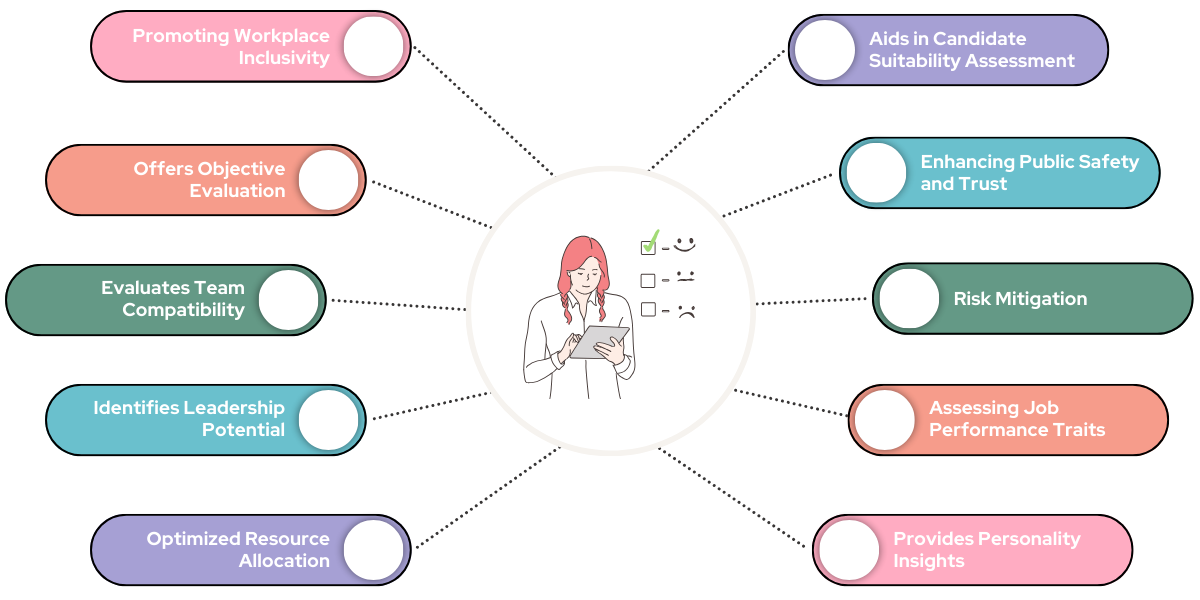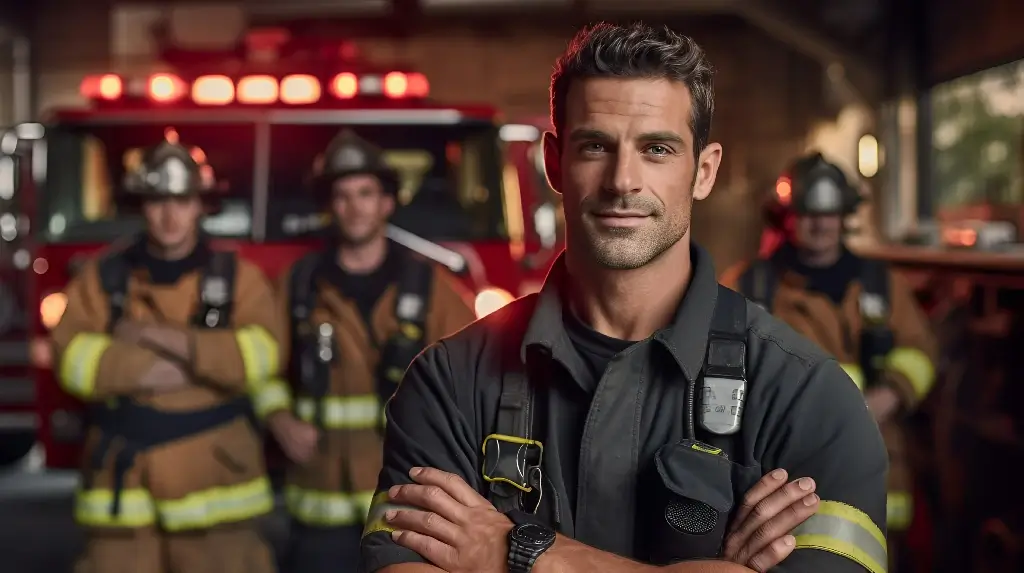Firefighter Psych QuickPass: Psychologist-Designed Prep Course + Free Practice Test
- Overview
- Free Practice
- Format
- Curriculum
- Reviews
The Firefighter Psych Test is a crucial element of the hiring process, distinguishing those genuinely suited for the job and its demands from those merely seeking adrenaline-fueled excitement. Major fire departments across the United States administer this test, making it a key component of all significant firefighting exam formats. Here’s a closer look at what the firefighter Psychological Test entails and how to prepare for it.
Free Firefighter Psych Practice Test
Here’s a free practice test with questions from our prep course to help you understand the exam format.
Test Your Knowledge Now
What is the Firefighter Psych Test?
Typically, this test is one of the final stages in the hiring process, following background checks, physical fitness tests, polygraph exams, and interviews. To ensure they select the right candidates for this demanding role, fire departments administer the Firefighter Psych Test. This screening provides insight into a person’s character, evaluating various aspects of an applicant’s psychological well-being, personality traits, decision-making abilities, problem-solving skills, emotional stability, and resilience.
The Firefighter Psych Test is vital for identifying any psychological issues or personality traits that could impact an individual’s ability to perform their duties effectively. It involves psychological questionnaires, interviews, and situational judgment tests to thoroughly assess a candidate’s personality and readiness for the role of a firefighter.
Role of Psychological Test in Recruiting Firefighters

Exam Format & Question Types
Now that you've taken the practice quiz, let's explore the different types of question formats covered in our course for the Firefighter Psych Test. In these assessments, there's a vast array of response formats to navigate. Here are the most common ones:
Different organizations and departments may use varied formats and criteria for their tests. It's essential to be familiar with the specific format used by the department you're applying to.
While the names of the tests might seem typical, they primarily differ in the traits assessed & the format of questioning. In our prep course, we've dedicated an entire lesson to breaking down each format with sample questions and thorough explanations. Plus, we offer an abundance of practice questions to help you get a firm grasp.
Firefighter Psych Test Process
Assessing the psychological fitness of firefighter candidates is a complex and vital step in determining their suitability for the job. This process is not designed to simply pass or fail individuals outright. Instead, its primary goal is to systematically evaluate whether candidates possess the essential personality traits and mental resilience needed to thrive in the high-pressure environment of firefighting.
While the specific components of the firefighter psychological assessment may vary between fire departments, the general process typically includes a comprehensive questionnaire followed by a detailed interview. This approach ensures a thorough evaluation of each candidate’s mental preparedness and suitability for the demanding role of a firefighter.
Psychological Questionnaire
This is a straightforward question-answer format which can be completed online or on paper. Questions come in various styles like multiple-choice, ranking, or open-ended. They they are meant to test areas such as personality, emotional stability, decision-making, problem-solving, stress handling, and moral judgment.
Lets look at a sample statement that is meant to test your leadership skill:
This question asks you to choose the degree of agreement with the statement. How you answer will shape the leadership score on the test & let the department know what type of leader you can become.
One-on-One Interview with a Licensed Psychologist
Just like you face interviews where a panel gets to know you better, certain fire departments take their evaluations a step further by setting up one-on-one sessions with professional psychologists. These aren’t your typical conversations—they are a deep dive into who you are, your life’s journey, and what pulls you towards firefighting.
The psychologist will look at how well you communicate, how stable you are emotionally, your honesty levels, how well you can handle stress, and how self-aware you are. All these factors together help paint a clearer picture of whether you’re truly ready to take on the challenges of a firefighting career.
Core Qualities Tested in the Firefighter Psych Test
The Firefighter personality Psych Test is a comprehensive assessment of several key behavioral characteristics. This examination examines a variety of personality and behavioral attributes that may directly affect their day-to-day firefighting work, a person's ability to perform essential firefighting duties, and their capacity to work effectively in emergency and high-pressure situations.
Emotional and Interpersonal Aspects
Individual and Cognitive Aspects
Skills and Traits

Firefighter Psych QuickPass
Last Updated: Oct 08, 2025
Course Content
-
 Introduction 2 StepsBuy this Course: Get full access to all lessons, practice tests and guides.
Introduction 2 StepsBuy this Course: Get full access to all lessons, practice tests and guides. -
 Analyzing Components 1 StepBuy this Course: Get full access to all lessons, practice tests and guides.
Analyzing Components 1 StepBuy this Course: Get full access to all lessons, practice tests and guides. -
 Question Traits Breakdown 3 StepsBuy this Course: Get full access to all lessons, practice tests and guides.
Question Traits Breakdown 3 StepsBuy this Course: Get full access to all lessons, practice tests and guides. -
 Exploring Exam Structure 3 StepsBuy this Course: Get full access to all lessons, practice tests and guides.
Exploring Exam Structure 3 StepsBuy this Course: Get full access to all lessons, practice tests and guides. -
 Exam Strategies 1 StepBuy this Course: Get full access to all lessons, practice tests and guides.
Exam Strategies 1 StepBuy this Course: Get full access to all lessons, practice tests and guides. -
 Practice Questions 8 StepsBuy this Course: Get full access to all lessons, practice tests and guides.
Practice Questions 8 StepsBuy this Course: Get full access to all lessons, practice tests and guides.- Fire Psych - Practice Questions - Yes/No
- Fire Psych - Practice Questions - Ranking
- Fire Psych - Practice Questions - 5 Point
- Fire Psych - Practice Questions - 7 Point
- Firefighter Psych Practice Questions - SJT
- Firefighter Psych Practice Question- Best Choice/Worst Choice
- Firefighter Psych Practice Questions – Best Choice
Why Choose Firefighter Psych QuickPass?
Psych evaluations vary by department and the stakes are high. Firefighter Psych QuickPass delivers focused, realistic prep to build your confidence and sharpen your skills. Here's how we set you up for success:
Real Test Simulations
Experience authentic psych-evaluation formats from leading fire departments, so you walk into the exam knowing exactly what to expect.
Biggest Practice Quiz Bank
Tackle 8 quizzes packed with 150+ high-impact questions spanning every format and scenario.
Section-by-Section Mastery Guides
Dive into detailed guides that break down every trait and question type—nothing is left uncovered.
Unlimited Practice
Reinforce your skills with unlimited quiz attempts, giving you the freedom to practice until you're truly ready.
Self-Paced, Progressive Challenges
Advance through tailored difficulty levels, building from foundational basics to expert-level scenarios on your own schedule.
Success Stories
4.7 27 Reviews
rob, 16 Jan
Solid review course that covers the…
Solid review course that covers the relevant topics in good detail
chad, 11 Jan
Great Program, amazing practice simulations
Easy to understand. Passed tests on first time thru.
QUEEN RIGHTEOUS, 07 Jan
Highly recommended.Great instructional…
Highly recommended.Great instructional information. I passed on the first try.
MasterCommand, 14 Nov
Prepterminal. Prepare, practice, execute.
To say that Prepterminal helped me prepare and be ready for the testing phase would be an understatement. At first, looking at the course, I felt overwhelmed with the course material, but the course broke down each subject effectively which made it easier to understand. There were a few issues with some of the audio portion of the testing course, but beyond that, the course was well worth the money.
Abazix LLC, 09 Nov
Would recommend
Study material helped to pass my test on the first try.
Natalia M. Delgado, 08 Nov
Exelent course 100% guaranteed
Exelent course 100% guaranteed
Ready to Transform Your Future as a Firefighter?
Join hundreds who’ve aced their psychological evaluation with Firefighter Psych QuickPass.
🔴 Get instant access to realistic simulations and unlimited practice. 🔴
Frequently Asked Questions (FAQs)
What is the firefighter psychological exam and why is it important?
It’s a pre-employment psychological screening administered late in the hiring process—after physical/agility tests and background checks—to assess personality, decision-making, and stress tolerance. Rather than simply pass/fail, it evaluates your resilience, teamwork, and emotional stability to ensure you can handle the demands of firefighting.
When in the hiring process do candidates take the psychological exam?
Most departments schedule it near the end—often the same day as medical exams or just after background checks and interviews. Passing this screen is typically required before your final offer or academy entry.
What kinds of questions and formats are on firefighter psychological tests?
Formats include multiple-choice or true/false items, Likert scales (agree/disagree), ranking/pair comparisons, and situational-judgment scenarios (e.g., responding to a coworker conflict). Tests are usually timed (often 2–3 hours) and delivered on paper or computer.
What personality traits or qualities do these exams assess?
Key traits include teamwork, emotional stability, flexibility, decisiveness, integrity, resilience, and empathy. Examiners look for calmness under pressure, respect for authority, cooperation, and genuine concern for others—qualities the Firefighter Psych QuickPass helps you practice and demonstrate consistently.
How can I prepare for the firefighter psychological exam?
Preparation focuses on understanding the desired traits, not memorizing facts. Review core firefighter values (teamwork, honesty, stress management), practice sample personality and situational-judgment questions, and answer honestly to avoid response inconsistencies. A good night’s sleep and stress-management techniques also help you perform at your best.
How are firefighter psychological tests scored or interpreted?
There’s no fixed “passing score.” Psychologists compare your response profile against the ideal firefighter profile, using norm-referenced or criterion-based methods to flag extreme or inconsistent answers. A profile matching the desired traits leads to clearance; significant red flags may trigger further review.
What could disqualify me in a firefighter psychological screening?
Disqualifiers include chronic anger issues, extreme anxiety, distrustful or antisocial tendencies, refusal to accept rules, lack of empathy or teamwork, and panicking under pressure. Departments vary, but stability under stress and commitment to the team are universal must-haves.
Do firefighter psychological tests differ between the US, Canada, and the UK?
- United Kingdom (UK): A national system with three timed ability tests (numerical, verbal, situational awareness) plus a 127-item Personal Qualities & Attributes questionnaire.
- Canada: Varies by province/department (e.g., Ontario’s Emotional Stability & Resiliency assessment, written aptitude tests followed by psych screening).
- United States (US): No single national test—departments use their own inventories (MMPI-2, NEO-PI-R, CPI) and situational-judgment sections.
Is there a one-on-one psychological interview, and what should I expect?
Yes. After the written exam, you may meet with a licensed psychologist who’ll explore your background, personality, and motivations. Expect questions on stress management, past teamwork/conflict examples, and why you want to be a firefighter. The interview verifies your questionnaire responses—firefighters with strong self-awareness, integrity, and maturity shine here.
How closely do the course’s reports mirror the actual test?
While we don’t replicate the exact official report, Firefighter Psych QuickPass’s report engine—designed by a certified psychologist—maps your practice responses to the same 22 core traits tested on the real exam. You’ll see precisely how each answer influences your profile, so you understand how evaluators interpret your results.
Why take a prep course if the firefighter psych test assesses fixed traits?
Because how you understand and present those traits matters. Firefighter Psych QuickPass helps you:
- Decode what your answers actually imply.
- Understand the purpose behind the questions.
- Align your real strengths with what the role values.
- Avoid common mistakes from misreading questions.
- Show up authentically—with confidence.
- Prepare for multiple test formats and interviews.
- It’s not about changing who you are—it’s about presenting your best self, the right way.
If the test measures genuine personality, won’t prepping lead to dishonest answers?
Not at all. Our course isn’t about faking answers—it’s about understanding them. We help you see what each question is really measuring, so you can respond truthfully and with clarity. With the right prep, you don’t change who you are—you just show up as your best, most aligned self.
If I score low on some traits in practice, does that mean firefighting isn’t for me?
Absolutely not. Everyone has unique strengths and growth areas—low scores highlight where you can develop. Firefighter Psych QuickPass helps you reframe these traits, showing how they can be assets in specific firefighting roles and guiding you on presenting them positively.
How current is your course content with evolving firefighting roles and responsibilities?
Firefighter Psych QuickPass is updated regularly to reflect the latest research in firefighter psychology and any changes in department screening criteria. You’ll always train with the most current standards and question formats.

Created by: Tanoo Purohit
MSc - Clinical Psychology, Psychometric Tutor, Prepterminal Test Expert
138 students, 4.7, 27 Reviews
I’m Tanoo Purohit, with a BA honors and an MSc in Clinical Psychology from the renowned National Forensic Sciences University. Over seven years, I’ve studied the intricacies of the human psyche (as a part of my curriculum and practice). Proudly associated with PrepTerminal, I serve as a Psychometric Course Author and am recognized as a Psychological Test Expert. In every course I craft, I merge my expansive knowledge with relatable insights, ensuring that complex psychological concepts are presented with clarity and resonance for all learners. Feel free to contact me at [email protected].
